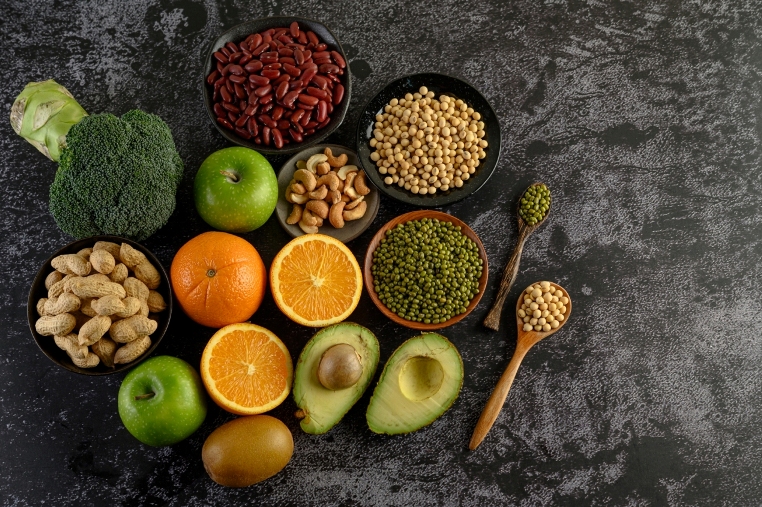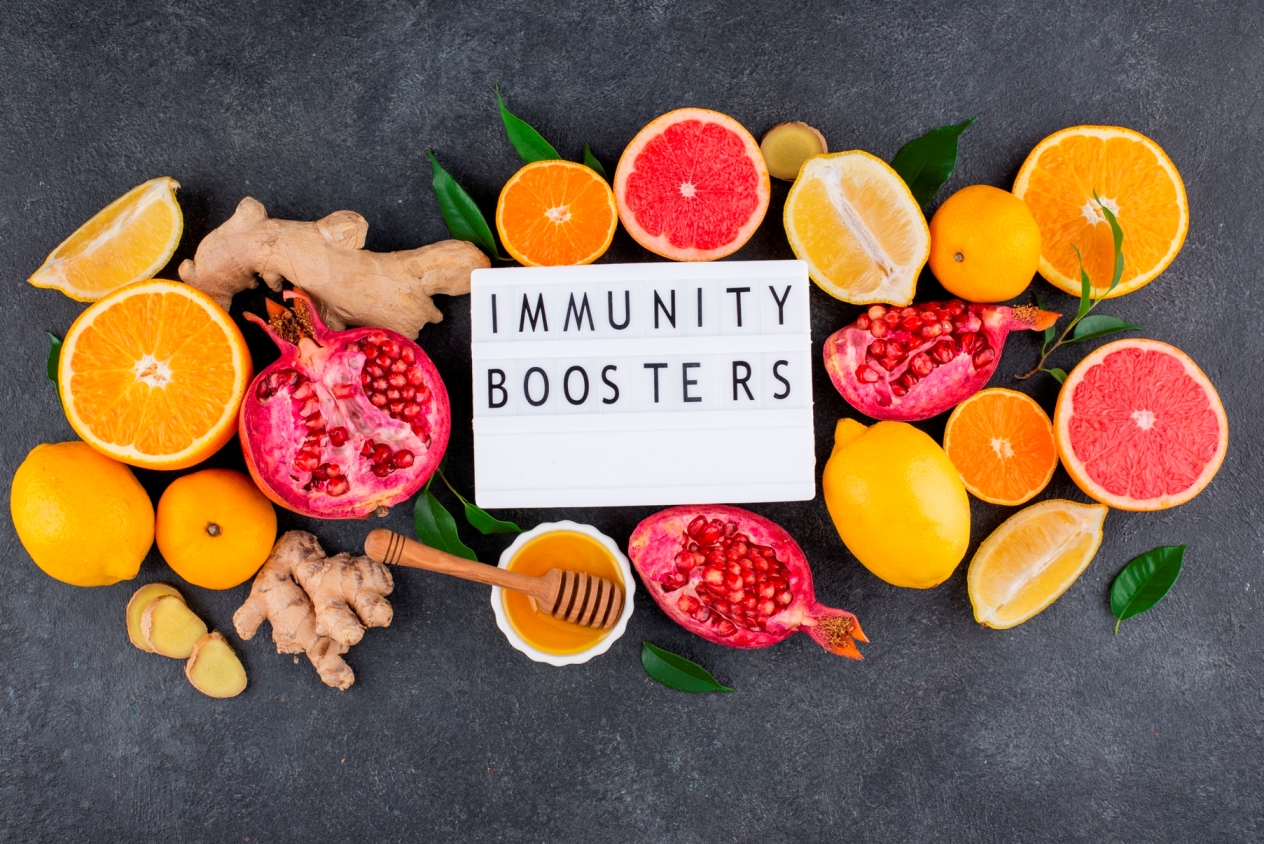COVID-19 research continuously demonstrates that a well-balanced diet full of immunity-boosting superfoods can greatly aid in healing and long-term protection, even though vaccinations, personal hygiene, and medical treatments are still essential. Building a strong immune system is now more than just a wellness goal—it’s a crucial component of recovery as COVID-19 cases rise once more in 2025.
The top ten superfoods that can naturally boost your immune system, particularly during and after a COVID-19 infection, will be discussed in this article. To help you incorporate these superfoods into your daily routine, we’ve also included a useful one-day meal plan with breakfast, lunch, and dinner ideas. Additionally, for those interested in natural remedies that support immunity and reduce inflammation, check out our detailed guide on Ayurvedic herbs for inflammation relief.
Why Superfoods Boost Immunity Against COVID‑19
The immune system is very active when the body is battling COVID-19. Oxidative stress, inflammation, and possible tissue damage result from this. Strategic nourishment is necessary for recovery, not just rest.
Here’s how superfoods help during this critical time:
- Improve oxygen transport and blood circulation
- Support red and white blood cell production
- Repair damaged tissues and cells
- Enhance gut microbiota, which supports overall immunity
- Reduce systemic inflammation
- Strengthen the lungs and respiratory function
Superfoods contain concentrated nutrients and bioactive substances that have been shown to aid in these functions. Let’s explore the top ten superfoods for 2025 that will boost immunity.

Top 10 Immunity-Boosting Superfoods in 2025
Including immunity-boosting foods in your daily diet can help your body fight infections naturally. Here are the top 10 superfoods to strengthen immunity in 2025, along with details on what they are, their benefits, nutrients, and potential risks.
1. Spinach
What Is: Spinach is a leafy green vegetable rich in vitamins, minerals, and antioxidants. It is commonly used in salads, smoothies, and cooked dishes.
Benefits: Spinach boosts red blood cell production and strengthens white blood cells that fight infections. It also supports heart health and energy levels.
Nutrients per Serving: One cup (30g) of raw spinach provides approximately 7 calories, 0.9g protein, 0.1g fat, 1.1g fiber, 2.9mg vitamin C, 167mg potassium, and 0.8mg iron.
Risks: Excessive spinach intake may interfere with calcium absorption due to oxalates. People on blood-thinning medications should monitor vitamin K intake.
2. Citrus Fruits
What Is: Citrus fruits include oranges, lemons, limes, and grapefruits, known for their high vitamin C content. They are usually consumed fresh, juiced, or as flavorings.
Benefits: Vitamin C in citrus fruits enhances white blood cell production and protects the body against infections. They also promote skin health and reduce oxidative stress.
Nutrients per Serving: One medium orange (131g) contains about 62 calories, 1.2g protein, 0.2g fat, 3.1g fiber, 70mg vitamin C, 237mg potassium, and small amounts of calcium.
Risks: Excess consumption can cause acid reflux or stomach upset in sensitive individuals. Citrus may interact with certain medications like statins or antibiotics.
3. Garlic
What Is: Garlic is a pungent herb used as a flavoring and traditional medicine for its antimicrobial properties. It can be eaten raw, cooked, or in supplements.
Benefits: Garlic has antiviral and antibacterial properties that reduce infection severity. It also supports heart health and regulates blood pressure.
Nutrients per Serving: One clove (3g) contains about 4.5 calories, 0.2g protein, 0g fat, 1g carbohydrate, and trace amounts of vitamins C and B6, manganese, and selenium.
Risks: Overconsumption may cause bad breath, heartburn, or digestive upset. It may interact with blood-thinning medications.
4. Ginger
What Is: Ginger is a root spice used worldwide in cooking and herbal remedies. It has antioxidant and anti-inflammatory properties.
Benefits: Ginger reduces sore throat, congestion, and digestive discomfort. It also improves circulation and has immune-boosting effects.
Nutrients per Serving: One tablespoon (6g) of fresh ginger provides 5 calories, 0.1g protein, 0g fat, 1g carbohydrate, and 0.1g fiber along with gingerols and antioxidants.
Risks: High intake can cause heartburn, gas, or mild bleeding in sensitive individuals. Consult a doctor if taking blood thinners.
5. Yogurt
What Is: Yogurt is a fermented dairy product rich in probiotics and vitamin D, supporting gut health and immunity.
Benefits: Yogurt strengthens gut microbiota, improves digestion, and enhances overall immune response. It also supports bone health.
Nutrients per Serving: One cup (245g) of plain yogurt provides about 149 calories, 8.5g protein, 8g fat, 11g carbohydrates, 1.3g fiber, 276mg calcium, and 2.2mcg vitamin D.
Risks: Flavored or sweetened yogurt can contain added sugars. Lactose-intolerant individuals should choose lactose-free options.
6. Turmeric
What Is: Turmeric is a bright yellow spice derived from the Curcuma longa plant, commonly used in cooking and traditional medicine.
Benefits: Curcumin in turmeric is a strong antioxidant and anti-inflammatory compound, protecting immune cells and promoting overall wellness.
Nutrients per Serving: One teaspoon (3g) of turmeric powder contains 9 calories, 0.3g protein, 0.3g fat, 2g carbohydrate, and small amounts of iron and manganese.
Risks: Excessive intake may cause digestive issues or interact with blood-thinning medications.
7. Berries
What Is: Berries include blueberries, strawberries, raspberries, and blackberries, packed with vitamins, fiber, and antioxidants.
Benefits: Berries protect immune cells from damage, improve skin health, and reduce inflammation due to high vitamin C and anthocyanin content.
Nutrients per Serving: One cup (150g) of mixed berries provides 70 calories, 1g protein, 0.5g fat, 17g carbohydrate, 7g fiber, and 85mg vitamin C.
Risks: Excessive consumption may cause digestive discomfort in sensitive individuals.
8. Seeds and Nuts
What Is: Nuts and seeds like almonds, walnuts, pumpkin seeds, flaxseeds, and sunflower seeds are nutrient-dense foods that support immunity.
Benefits: They provide essential fats, zinc, selenium, and vitamin E, all crucial for immune function. They also support heart and brain health.
Nutrients per Serving: One ounce (28g) mixed nuts contains about 160–200 calories, 5–6g protein, 14–18g fat, 6g carbohydrates, and 3g fiber.
Risks: High-calorie content can contribute to weight gain if overeaten. Nut allergies must be considered.
9. Mushrooms
What Is: Mushrooms like shiitake, maitake, and oyster contain beta-glucans, compounds that activate immune cells.
Benefits: Mushrooms enhance T-cell and natural killer cell activity, improving the body’s defense against infections. They also support heart health and provide antioxidants.
Nutrients per Serving: One cup (70g) of raw mushrooms contains 15 calories, 2g protein, 0g fat, 2g carbohydrate, 1g fiber, 0.3mg copper, and small amounts of B vitamins.
Risks: Some wild mushrooms can be toxic. Stick to edible varieties from reliable sources.
10. Green Tea
What Is: Green tea is an antioxidant-rich beverage made from Camellia sinensis leaves, widely consumed for health benefits.
Benefits: Green tea catechins boost immunity, reduce oxidative stress, and improve metabolism. It also has mild antiviral and anti-inflammatory properties.
Nutrients per Serving: One cup (240ml) contains about 2 calories, 0g protein, 0g fat, 0g carbohydrate, and 30–50mg catechins.
Risks: Excessive consumption may cause insomnia or stomach upset due to caffeine content.
One-Day Immunity-Boosting Superfood Meal Plan (COVID-19 Recovery)
Eating a healthy diet during COVID-19 recovery entails selecting foods that are nutrient-dense, easy to digest, and promote healing. Using the aforementioned superfoods, here is a straightforward, healthful meal plan:
Breakfast (8:00 AM – 9:00 AM)
Golden Immunity Smoothie
- 1 ripe banana
- ½ cup plain yogurt (probiotic-rich)
- 1 handful of spinach
- 1 tbsp ground flaxseeds
- ½ tsp turmeric + pinch of black pepper
- 1 cup almond milk or warm water
Herbal Green Tea
• Combine fresh ginger slices, green tea leaves, and a squeeze of lemon juice.
Benefits: Packed with probiotics, antioxidants, and anti-inflammatory agents, this breakfast is a great way to start the day and is easy to digest.
Mid-Morning Snack (11:00 AM)
Citrus Immunity Bowl
- Orange slices
- Pomegranate seeds or kiwi
- Sprinkle of sunflower or pumpkin seeds
Tip: Let fruits come to room temperature to avoid respiratory discomfort.
Lunch (1:00 PM – 2:00 PM)
Palak Dal (Spinach Lentil Stew)
- Masoor or moong dal cooked with spinach, garlic, turmeric, and a drizzle of ghee.
Brown Rice or Multigrain Roti
Cucumber & Carrot Salad
- Drizzle lemon juice and a pinch of rock salt.
Buttermilk with Crushed Ginger
- Cools the system and supports gut health.
Immune Support: Iron, protein, probiotics, and antioxidants are all present in this lunch and are necessary for immune recovery and cellular repair.
Evening (4:00 PM – 5:00 PM)
Ginger-Tulsi Kadha
• Bring fresh ginger, turmeric, crushed black pepper, and tulsi (holy basil) to a boil. Strain and take a warm sip.
Handful of Mixed Nuts & Seeds
- Almonds, walnuts, flaxseeds, pumpkin seeds.
Boosts: Adaptogens, omega-3 fatty acids, and antioxidants that reduce inflammation and soothe the nervous system.
Dinner (7:30 PM – 8:30 PM)
Vegetable & Mushroom Soup
- Shiitake mushrooms, carrots, garlic, onions, turmeric, and herbs.
Whole Wheat Roti or Steamed Brown Rice
Stir-Fried Seasonal Veggies
- Spinach, broccoli, beans, sautéed in ginger and garlic.
Warm Water with Lemon Before Bed
Benefits: This healthy, high-antioxidant dinner aids in digestion, reduces inflammation, and encourages sound sleep.
Optional: Before Bed
Golden Milk (Haldi Doodh)
- Warm milk with ½ tsp turmeric, a pinch of black pepper, and jaggery for sweetness.
Bonus Tips for Stronger Immunity
Promotes deep sleep and overnight recovery.
- Hydrate Regularly: Warm water with lemon or herbal tea is best.
- Avoid Processed Foods: Refined sugar, fried items, and packaged foods can suppress immunity.
- Rest Well: Your body heals best during sleep.
- Gentle Movement: Light stretching or breathing exercises (pranayama) aid lung function and circulation.
Frequently Asked Questions (FAQ)
Q1. Can these foods prevent COVID-19?
No, these foods cannot prevent or cure COVID-19. They help strengthen the immune system, but they are not a substitute for vaccination, proper hygiene, or medical treatment.
Q2. How much of these superfoods should I consume daily?
You should include 1–2 servings of a variety of superfoods in your daily diet. Balance is important—don’t rely on just one type of food.
Q3. Are there any side effects of consuming these superfoods daily?
Most natural superfoods are safe in moderate quantities. However, excessive use—especially of herbs like turmeric or garlic—can cause digestive upset or interact with medications. Always consult your doctor if you’re on regular medication.
Q4. Where can I buy these immunity-boosting foods in India?
You can find most of them in local markets, Ayurvedic stores, or online platforms like Amazon, BigBasket, and 1mg.
Q5. Should I continue taking supplements along with these foods?
Yes, if prescribed by a healthcare provider. These superfoods are complementary to your existing nutrition plan, not a replacement for prescribed supplements
Conclusion
Building a strong immune system with superfoods like turmeric, moringa, ginger, and citrus fruits is one of the simplest ways to protect your health—especially in a post-COVID world. These natural foods offer anti-inflammatory, antioxidant, and immunity-enhancing benefits that contribute to overall wellness.
But remember, no food is a magic bullet. Combine these with proper sleep, hygiene, physical activity, and medical consultation when needed.
For more guidance, check the World Health Organization – Nutrition Tips During COVID-19.
Want more evidence-based health guides? Visit PharmacyProfessor.com for expert tips, remedies, and pharmacy-focused wellness advice.


Good
thank you dear